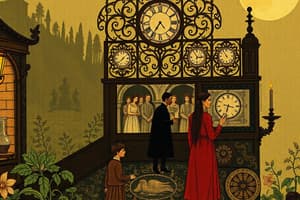Podcast
Questions and Answers
How does an author usually indicate instructional sequence in informational texts?
How does an author usually indicate instructional sequence in informational texts?
- By starting each paragraph with 'first this happens...'
- By numbering each instruction (correct)
- By providing dates and years
- By using phrases like 'In the previous chapter, you learned...'
What is a common feature of texts that present information in a chronological sequence?
What is a common feature of texts that present information in a chronological sequence?
- The use of phrases like 'In the previous chapter, you learned...'
- The author includes a 'See Also' section
- The chapters are labeled 'How to...'
- The author provides years and dates (correct)
How can a reader identify a foundational sequence in an informational text?
How can a reader identify a foundational sequence in an informational text?
- By looking at the table of contents
- By numbering each instruction
- By checking the 'See Also' section
- By phrases like 'In the previous chapter, you learned...' (correct)
What technique can be used to understand the sequencing of online informational texts?
What technique can be used to understand the sequencing of online informational texts?
Which type of text sequencing involves presenting information as if the reader has already learned and remembered foundational knowledge?
Which type of text sequencing involves presenting information as if the reader has already learned and remembered foundational knowledge?
What is a characteristic of instructional sequence in informational texts?
What is a characteristic of instructional sequence in informational texts?
How can a reader typically identify a chronological sequence in an informational text?
How can a reader typically identify a chronological sequence in an informational text?
What is one way to determine how information in an online source relates to other content?
What is one way to determine how information in an online source relates to other content?
Why is it important to understand the sequence of events in a text?
Why is it important to understand the sequence of events in a text?
What is meant by the term 'sequence of events' in a text?
What is meant by the term 'sequence of events' in a text?
How does informational text differ from fiction?
How does informational text differ from fiction?
What is a characteristic of informational text regarding the sequence of events?
What is a characteristic of informational text regarding the sequence of events?
In what manner does a science textbook typically present information?
In what manner does a science textbook typically present information?
What is the main challenge in spotting the sequence of events in an informational text?
What is the main challenge in spotting the sequence of events in an informational text?
Why might understanding the sequence of events be difficult for some readers in an informational text?
Why might understanding the sequence of events be difficult for some readers in an informational text?
Flashcards are hidden until you start studying
Study Notes
Sequence of Events
- A sequence of events is the order in which events or information are presented in a text.
- Understanding the sequence of events is crucial to comprehending what you're reading.
Informational Text
- Informational text is any body of nonfiction writing that provides facts or information to a reader.
- It may not always follow a story-like pattern, and its sequence can vary.
Types of Sequence of Events
- Chronological sequence: presents information in the order in which events happened, often used in historical texts.
- Instructional sequence: presents information in the exact order in which it should be performed, often used in recipes and instruction manuals.
- Foundational sequence: presents information assuming the reader has learned and remembered previous information, often used in math and science texts.
Identifying Sequence of Events
- Chronological sequence: look for phrases like 'first this happens, and then...' or 'these events were followed by...', and dates and years.
- Instructional sequence: look for numbered instructions.
- Foundational sequence: look for phrases like 'In the previous chapter, you learned' or 'In our next topic, you will learn how to...' in the first and last paragraphs of a chapter.
Other Methods for Identifying Sequence
- Check the table of contents to see how the author has ordered their chapters.
- Look at the beginning and ending paragraphs of a text or chapter to understand how the information relates to other information.
- For online sources, look for a 'See Also' section to understand how the information fits into a sequence of other sources.
Studying That Suits You
Use AI to generate personalized quizzes and flashcards to suit your learning preferences.




